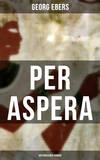Kitabı oku: «Homo Sum. Complete», sayfa 13
CHAPTER XIV
At noon of the following day the senator went to the women’s room, and while he was still on the threshold, he asked his wife—who was busy at the loom:
“Where is Polykarp? I did not find him with Antonius, who is working at the placing of the altar, and I thought I might find him here.”
“After going to the church,” said Dorothea, “he went up the mountain. Go down to the workshops, Marthana, and see if your brother has come back.”
Her daughter obeyed quickly and gladly, for her brother was to her the dearest, and seemed to her to be the best, of men. As soon as the pair were alone together Petrus said, while he held out his hand to his wife with genial affection, “Well, mother—shake hands.” Dorothea paused for an instant, looking him in the face, as if to ask him, “Does your pride at last allow you to cease doing me an injustice?” It was a reproach, but in truth not a severe one, or her lips would hardly have trembled so tenderly, as she said.
“You cannot be angry with me any longer, and it is well that all should once more be as it ought.”
All certainly had not been “as it ought,” for since the husband and wife had met in Polykarp’s work-room, they had behaved to each other as if they were strangers. In their bedroom, on the way to church, and at breakfast, they had spoken to each no more than was absolutely necessary, or than was requisite in order to conceal their difference from the servants and children. Up to this time, an understanding had always subsisted between them that had never taken form in words, and yet that had scarcely in a single case been infringed, that neither should ever praise one of their children for anything that the other thought blameworthy, and vice versa.
But in this night, her husband had followed up her severest condemnation by passionately embracing the wrong-doer. Never had she been so stern in any circumstances, while on the other hand her husband, so long as she could remember, had never been so softhearted and tender to his son, and yet she had controlled herself so far, as not to contradict Petrus in Polykarp’s presence, and to leave the work-room in silence with her husband.
“When we are once alone together in the bedroom,” thought she, “I will represent to him his error as I ought, and he will have to answer for himself.”
But she did not carry out this purpose, for she felt that something must be passing in her husband’s mind that she did not understand; otherwise how could his grave eyes shine so mildly and kindly, and his stern lips smile so affectionately after all that had occurred when he, lamp in hand, had mounted the narrow stair.
He had often told her that she could read his soul like an open book, but she did not conceal from herself that there were certain sides of that complex structure whose meaning she was incapable of comprehending. And strange to say, she ever and again came upon these incomprehensible phases of his soul, when the images of the gods, and the idolatrous temples of the heathen, or when their sons’ enterprises and work were the matters in hand. And yet Petrus was the son of a pious Christian; but his grandfather had been a Greek heathen, and hence perhaps a certain something wrought in his blood which tormented her, because she could not reconcile it with Agapitus’ doctrine, but which she nevertheless dared not attempt to oppose because her taciturn husband never spoke out with so much cheerfulness and frankness as when he might talk of these things with his sons and their friends, who often accompanied them to the oasis. Certainly, it could be nothing sinful that at this particular moment seemed to light up her husband’s face, and restore his youth.
“They just are men,” said she to herself, “and in many things they have the advantage of us women. The old man looks as he did on his wedding-day! Polykarp is the very image of him, as every one says, and now, looking at the father, and recalling to my mind how the boy looked when he told me how he could not refrain from making Sirona’s portrait, I must say that I never saw such a likeness in the whole course of my life.”
He bid her a friendly good night, and extinguished the lamp. She would willingly have said a loving word to him, for his contented expression touched and comforted her, but that would just then have been too much after what she had gone through in her son’s workroom. In former years it had happened pretty often that, when one of them had caused dissatisfaction to the other, and there had been some quarrel between them, they had gone to rest unreconciled, but the older they grew the more rarely did this occur, and it was now a long time since any shadow had fallen on the perfect serenity of their married life.
Three years ago, on the occasion of the marriage of their eldest son, they had been standing together, looking up at the starry sky, when Petrus had come close up to her, and had said, “How calmly and peacefully the wanderers up there follow their roads without jostling or touching one another! As I walked home alone from the quarries by their friendly light, I thought of many things. Perhaps there was once a time when the stars rushed wildly about in confusion, crossing each other’s path, while many a star flew in pieces at the impact. Then the Lord created man, and love came into the world and filled the heavens and the earth, and he commanded the stars to be our light by night; then each began to respect the path of the other, and the stars more rarely came into collision till even the smallest and swiftest kept to its own path and its own period, and the shining host above grew to be as harmonious as it is numberless. Love and a common purpose worked this marvel, for he who loves another, will do him no injury, and he who is bound to perfect a work with the help of another, will not hinder nor delay him. We two have long since found the right road, and if at any time one of us is inclined to cross the path of the other, we are held back by love and by our common duty, namely to shed a pure light on the path of our children.”
Dorothea had never forgotten these words, and they came into her mind now again when Petrus held out his hand to her so warmly; as she laid hers in it, she said:
“For the sake of dear peace, well and good—but one thing I cannot leave unsaid. Soft-hearted weakness is not usually your defect, but you will utterly spoil Polykarp.”
“Leave him, let us leave him as he is,” cried Petrus, kissing his wife’s brow. “It is strange how we have exchanged parts! Yesterday you were exhorting me to mildness towards the lad, and to-day—”
“To-day I am severer than you,” interrupted Dorothea. “Who, indeed, could guess that an old graybeard would derogate from the duties of his office as father and as judge for the sake of a woman’s smiling face in clay—as Esau sold his birthright for a mess of pottage?”
“And to whom would it occur,” asked Petrus, taking up his wife’s tone, “that so tender a mother as you would condemn her favorite son, because he labored to earn peace for his soul by a deed—by a work for which his master might envy him?”
“I have indeed observed,” interrupted Dorothea, “that Sirona’s image has bewitched you, and you speak as if the boy had achieved some great miracle. I do not know much about modelling and sculpture, and I will not contradict you, but if the fair-haired creature’s face were less pretty, and if Polykarp had not executed any thing remarkable, would it have made the smallest difference in what he has done and felt wrong? Certainly not. But that is just like men, they care only for success.”
“And with perfect justice,” answered Petrus, “if the success is attained, not in mere child’s play, but by a severe struggle. ‘To him, that hath, shall more be given,’ says the scripture, and he who has a soul more richly graced than others have—he who is helped by good spirits—he shall be forgiven many things that even a mild judge would be unwilling to pardon in a man of poor gifts, who torments and exerts himself and yet brings nothing to perfection. Be kind to the boy again. Do you know what prospect lies before you through him? You yourself in your life have done much good, and spoken much wisdom, and I, and the children, and the people in this place, will never forget it all. But I can promise you the gratitude of the best and noblest who now live or who will live in centuries to come—for that you are the mother of Polykarp!”
“And people say,” cried Dorothea, “that every mother has four eyes for her children’s merits. If that is true, then fathers no doubt have ten, and you as many as Argus, of whom the heathen legend speaks—But there comes Polykarp.”
Petrus went forward to meet his son, and gave him his hand, but in quite a different manner to what he had formerly shown; at least it seemed to Dorothea that her husband received the youth, no longer as his father and master, but as a friend greets a friend who is his equal in privileges and judgment. When Polykarp turned to greet her also she colored all over, for the thought flashed through her mind that her son, when he thought of the past night, must regard her as unjust or foolish; but she soon recovered her own calm equanimity, for Polykarp was the same as ever, and she read in his eyes that he felt towards her the same as yesterday and as ever.
“Love,” thought she, “is not extinguished by injustice, as fire is by water. It blazes up brighter or less bright, no doubt, according to the way the wind blows, but it cannot be wholly smothered—least of all by death.”
Polykarp had been up the mountain, and Dorothea was quite satisfied when he related what had led him thither. He had long since planned the execution of a statue of Moses, and when his father had left him, he could not get the tall and dignified figure of the old man out of his mind. He felt that he had found the right model for his work. He must, he would forget—and he knew, that he could only succeed if he found a task which might promise to give some new occupation to his bereaved soul. Still, he had seen the form of the mighty man of God which he proposed to model, only in vague outline before his mind’s eye, and he had been prompted to go to a spot whither many pilgrims resorted, and which was known as the Place of Communion, because it was there that the Lord had spoken to Moses. There Polykarp had spent some time, for there, if anywhere—there, where the Law-giver himself had stood, must he find right inspiration.
“And you have accomplished your end?” asked his father.
Polykarp shook his head.
“If you go often enough to the sacred spot, it will come to you,” said Dorothea. “The beginning is always the chief difficulty; only begin at once to model your father’s head.”
“I have already begun it,” replied Polykarp, “but I am still tired from last night.”
“You look pale, and have dark lines under your eyes,” said Dorothea anxiously. “Go up stairs and he down to rest. I will follow you and bring you a beaker of old wine.”
“That will not hurt him,” said Petrus, thinking as he spoke—“A draught of Lethe would serve him even better.”
When, an hour later, the senator sought his son in his work-room, he found him sleeping, and the wine stood untouched on the table. Petrus softly laid his hand on his son’s forehead and found it cool and free from fever. Then he went quietly up to the portrait of Sirona, raised the cloth with which it was covered, and stood before it a long time sunk in thought. At last he drew back, covered it up again, and examined the models which stood on a shelf fastened to the wall.
A small female figure particularly fixed his attention, and he was taking it admiringly in his band when Polykarp awoke.
“That is the image of the goddess of fate—that is a Tyche,” said Petrus.
“Do not be angry with me, father,” entreated Polykarp. “You know, the figure of a Tyche is to stand in the hand of the statue of the Caesar that is intended for the new city of Constantine, and so I have tried to represent the goddess. The drapery and pose of the arms, I think, have succeeded, but I failed in the head.” Petrus, who had listened to him with attention, glanced involuntarily at the head of Sirona, and Polykarp followed his eyes surprised and almost startled.
The father and son had understood each other, and Polykarp said, “I had already thought of that.”
Then he sighed bitterly, and said to himself, “Yes and verily, she is the goddess of my fate.” But he dared not utter this aloud.
But Petrus had heard him sigh, and said, “Let that pass. This head smiles with sweet fascination, and the countenance of the goddess that rules the actions even of the immortals, should be stern and grave.”
Polykarp could contain himself no longer.
“Yes, father,” he exclaimed. “Fate is terrible—and yet I will represent the goddess with a smiling mouth, for that which is most terrible in her is, that she rules not by stern laws, but smiles while she makes us her sport.”
CHAPTER XV
It was a splendid morning; not a cloud dimmed the sky which spread high above desert, mountain, and oasis, like an arched tent of uniform deep-blue silk. How delicious it is to breathe the pure, light, aromatic air on the heights, before the rays of the sun acquire their mid-day power, and the shadows of the heated porphyry cliffs, growing shorter and shorter, at last wholly disappear!
With what delight did Sirona inhale this pure atmosphere, when after a long night—the fourth that she had passed in the anchorite’s dismal cave-she stepped out into the air. Paulus sat by the hearth, and was so busily engaged with some carving, that he did not observe her approach.
“Kind good man!” thought Sirona, as she perceived a steaming pot on the fire, and the palm-branches which the Alexandrian had fastened up by the entrance to the cave, to screen her from the mounting sun. She knew the way without a guide to the spring from which Paulus had brought her water at their first meeting, and she now slipped away, and went down to it with a pretty little pitcher of burnt clay in her hand. Paulus did indeed see her, but he made as though he neither, saw nor heard, for he knew she was going there to wash herself, and to dress and smarten herself as well as might be—for was she not a woman! When she returned, she looked not less fresh and charming than on that morning when she had been seen and watched by Hermas. True, her heart was sore, true, she was perplexed and miserable, but sleep and rest had long since effaced from her healthy, youthful, and elastic frame all traces left by that fearful day of flight; and fate, which often means best by us when it shows us a hostile face, had sent her a minor anxiety to divert her from her graver cares.
Her greyhound was very ill, and it seemed that in the ill-treatment it had experienced, not only its leg had been broken, but that it had suffered some internal injury. The brisk, lively little creature fell down powerless when ever it tried to stand, and when she took it up to nurse it comfortably in her lap, it whined pitifully, and looked up at her sorrowfully, and as if complaining to her. It would take neither food nor drink; its cool little nose was hot; and when she left the cave, Iambe lay panting on the fine woollen coverlet which Paulus had spread upon the bed, unable even to look after her.
Before taking the dog the water she had fetched in the graceful jar—which was another gift from her hospitable friend—she went up to Paulus and greeted him kindly. He looked up from his work, thanked her, and a few minutes later, when she came out of the cave again, asked her, “How is the poor little creature?”
Sirona shrugged her shoulders, and said sadly, “She has drunk nothing, and does not even know me, and pants as rapidly as last evening—if I were to lose the poor little beast!—”
She could say no more for emotion, but Paulus shook his head.
“It is sinful,” he said, “to grieve so for a beast devoid of reason.”
“Iambe is not devoid of reason,” replied Sirona. “And even if she were, what have I left if she dies? She grew up in my father’s house, where all loved me; I had her first when she was only a few days old, and I brought her up on milk on a little bit of sponge. Many a time, when I heard the little thing whining for food, have I got out of bed at night with bare feet; and so she came to cling to me like a child, and could not do without me. No one can know how another feels about such things. My father used to tell us of a spider that beautified the life of a prisoner, and what is a dirty dumb creature like that to my clever, graceful little dog! I have lost my home, and here every one believes the worst of me, although I have done no one any harm, and no one, no one loves me but Iambe.”
“But I know of one who loves every one with a divine and equal love,” interrupted Paulus.
“I do not care for such a one,” answered Sirona. “Iambe follows no one but me; what good can a love do me that I must share with all the world! But you mean the crucified God of the Christians? He is good and pitiful, so says Dame Dorothea; but he is dead—I cannot see him, nor hear him, and, certainly, I cannot long for one who only shows me grace. I want one to whom I can count for something, and to whose life and happiness I am indispensable.”
A scarcely perceptible shudder thrilled through the Alexandrian as she spoke these words, and he thought, as he glanced at her face and figure with a mingled expression of regret and admiration, “Satan, before he fell, was the fairest among the pure spirits, and he still has power over this woman. She is still far from being ripe for salvation, and yet she has a gentle heart, and even if she has erred, she is not lost.”
Sirona’s eyes had met his, and she said with a sigh, “You look at me so compassionately—if only Iambe were well, and if I succeeded in reaching Alexandria, my destiny would perhaps take a turn for the better.”
Paulus had risen while she spoke, and had taken the pot from the hearth; he now offered it to his guest, saying:
“For the present we will trust to this broth to compensate to you for the delights of the capital; I am glad that you relish it. But tell me now, have you seriously considered what danger may threaten a beautiful, young, and unprotected woman in the wicked city of the Greeks? Would it not be better that you should submit to the consequences of your guilt, and return to Phoebicius, to whom unfortunately you belong?”
Sirona, at these words, had set down the vessel out of which she was eating, and rising in passionate haste, she exclaimed:
“That shall never, never be!—And when I was sitting up there half-dead, and took your step for that of Phoebicius, the gods showed me a way to escape from him, and from you or anyone who would drag me back to him. When I fled to the edge of the abyss, I was raving and crazed, but what I then would have done in my madness, I would do now in cold blood—as surely as I hope to see my own people in Arelas once more! What was I once, and to what have I come through Phoebicius! Life was to me a sunny garden with golden trellises and shady trees and waters as bright as crystal, with rosy flowers and singing birds; and he, he has darkened its light, and fouled its springs, and broken down its flowers. All now seems dumb and colorless, and if the abyss is my grave, no one will miss me nor mourn for me.”
“Poor woman!” said Paulus. “Your husband then showed you very little love.”
“Love,” laughed Sirona, “Phoebicius and love! Only yesterday I told you, how cruelly he used to torture me after his feasts, when he was drunk or when he recovered from one of his swoons. But one thing he did to me, one thing which broke the last thread of a tie between us. No one yet has ever heard a word of it from me; not even Dorothea, who often blamed me when I let slip a hard word against my husband. It was well for her to talk—if I had found a husband like Petrus I might perhaps have been like Dorothea. It is a marvel, which I myself do not understand, that I did not grow wicked with such a man, a man who—why should I conceal it—who, when we were at Rome, because he was in debt, and because he hoped to get promotion through his legate Quintillus, sold me—me—to him. He himself brought the old man—who had often followed me about—into his house, but our hostess, a good woman, had overheard the matter, and betrayed it all to me. It is so base, so vile—it seems to blacken my soul only to think of it! The legate got little enough in return for his sesterces, but Phoebicius did not restore his wages of sin, and his rage against me knew no bounds when he was transferred to the oasis at the instigation of his betrayed chief. Now you know all, and never advise me again to return to that man to whom my misfortune has bound me.
“Only listen how the poor little beast in there is whining. It wants to come to me, and has not the strength to move.”
Paulus looked after her sympathetically as she disappeared under the opening in the rock, and he awaited her return with folded arms. He could not see into the cave, for the space in which the bed stood was closed at the end by the narrow passage which formed the entrance, and which joined it at an angle as the handle of a scythe joins the blade. She remained a long time, and he could hear now and then a tender word with which she tried to comfort the suffering creature. Suddenly he was startled by a loud and bitter cry from Sirona; no doubt, the poor woman’s affectionate little companion was dead, and in the dim twilight of the cave she had seen its dulled eye, and felt the stiffness of death overspreading and paralyzing its slender limbs. He dared not go into the cavern, but he felt his eyes fill with tears, and he would willingly have spoken some word of consolation to her.
At last she came out, her eyes red with weeping. Paulus had guessed rightly for she held the body of little Iambe in her arms.
“How sorry I am,” said Paulus, “the poor little creature was so pretty.”
Sirona nodded, sat down, and unfastened the prettily embroidered band from the dog’s neck, saying half to herself, and half to Paulus, “My little Agnes worked this collar. I myself had taught her to sew, and this was the first piece of work that was all her own.” She held the collar up to the anchorite. “This clasp is of real silver,” she went on, “and my father himself gave it to me. He was fond of the poor little dog too. Now it will never leap and spring again, poor thing.”
She looked sadly down at the dead dog. Then she collected herself, and said hurriedly, “Now I will go away from here. Nothing—nothing keeps me any longer in this wilderness, for the senator’s house, where I have spent many happy hours, and where everyone was fond of me, is closed against me, and must ever be so long as he lives there. If you have not been kind to me only to do me harm in the end, let me go today, and help me to reach Alexandria.”
“Not to-day, in any case not to-day,” replied Paulus. “First I must find out when a vessel sails for Klysma or for Berenike, and then I have many other things to see to for you. You owe me an answer to my question, as to what you expect to do and to find in Alexandria. Poor child—the younger and the fairer you are—”
“I know all you would say to me,” interrupted Sirona. “Wherever I have been, I have attracted the eyes of men, and when I have read in their looks that I pleased them, it has greatly pleased me—why should I deny it? Many a one has spoken fair words to me or given me flowers, and sent old women to my house to win me for them, but even if one has happened to please me better than another, still I have never found it hard to send them home again as was fitting.”
“Till Hermas laid his love at your feet,” said Paulus. “He is a bold lad—”
“A pretty, inexperienced boy,” said Sirona, “neither more nor less. It was a heedless thing, no doubt, to admit him to my rooms, but no vestal need be ashamed to own to such favor as I showed him. I am innocent, and I will remain so that I may stand in my father’s presence without a blush when I have earned money enough in the capital for the long journey.”
Paulus looked in her face astonished and almost horrified.
Then he had in fact taken on himself guilt which did not exist, and perhaps the senator would have been slower to condemn Sirona, if it had not been for his falsely acknowledging it. He stood before her, feeling like a child that would fain put together some object of artistic workmanship, and who has broken it to pieces for want of skill. At the same time he could not doubt a word that she said, for the voice within him had long since plainly told him that this woman was no common criminal.
For some time he was at a loss for words; at last he said timidly:
“What do you purpose doing in Alexandria?”
“Polykarp says, that all good work finds a purchaser there,” she answered. “And I can weave particularly well, and embroider with gold-thread. Perhaps I may find shelter under some roof where there are children, and I would willingly attend to them during the day. In my free time and at night I could work at my frame, and when I have scraped enough together I shall soon find a ship that will carry me to Gaul, to my own people. Do you not see that I cannot go back to Phoebicius, and can you help me?”
“Most willingly, and better perhaps than you fancy,” said Paulus. “I cannot explain this to you just now; but you need not request me, but may rather feel that you have a good right to demand of me that I should rescue you.”
She looked at him in surprised enquiry, and he continued:
“First let me carry away the little dog, and bury it down there. I will put a stone over the grave, that you may know where it lies. It must be so, the body cannot be here any longer. Take the thing, which lies there. I had tried before to cut it out for you, for you complained yesterday that your hair was all in a tangle because you had not a comb, so I tried to carve you one out of bone. There were none at the shop in the oasis, and I am myself only a wild creature of the wilderness, a sorry, foolish animal, and do not use one.
“Was that a stone that fell? Aye, certainly, I hear a man’s step; go quickly into the cave and do not stir till I call you.”
Sirona withdrew into her rock-dwelling, and Paulus took the body of the dog in his arms to conceal it from the man who was approaching. He looked round, undecided, and seeking a hiding-place for it, but two sharp eyes had already detected him and his small burden from the height above him; before he had found a suitable place, stones were rolling and crashing down from the cliff to the right of the cavern, and at the same time a man came springing down with rash boldness from rock to rock, and without heeding the warning voice of the anchorite, flung himself down the slope, straight in front of him, exclaiming, while he struggled for breath and his face was hot with hatred and excitement:
“That—I know it well-that is Sirona’s greyhound—where is its mistress? Tell me this instant, where is Sirona—I must and will know.”
Paulus had frequently seen, from the penitent’s room in the church, the senator and his family in their places near the altar, and he was much astonished to recognize in the daring leaper, who rushed upon him like a mad man with dishevelled hair and fiery eyes, Polykarp, Petrus’ second son.
The anchorite found it difficult to preserve his calm, and composed demeanor, for since he had been aware that he had accused Sirona falsely of a heavy sin, while at the same time he had equally falsely confessed himself the partner of her misdeed, he felt an anxiety that amounted to anguish, and a leaden oppression checked the rapidity of his thoughts. He at first stammered out a few unintelligible words, but his opponent was in fearful earnest with his question; he seized the collar of the anchorite’s coarse garment with terrible violence, and cried in a husky voice, “Where did you find the dog? Where is—?”
But suddenly he left go his hold of the Alexandrian, looked at him from head to foot, and said softly and slowly:
“Can it be possible? Are you Paulus, the Alexandrian?”
The anchorite nodded assent. Polykarp laughed loud and bitterly, pressed his hand to his forehead, and exclaimed in a tone of the deepest disgust and contempt:
“And is it so, indeed! and such a repulsive ape too! But I will not believe that she even held out a hand to you, for the mere sight of you makes me dirty.” Paulus felt his heart beating like a hammer within his breast; and there was a singing and roaring in his ears. When once more Polykarp threatened him with his fist he involuntarily took the posture of an athlete in a wrestling match, he stretched out his arms to try to get a good hold of his adversary, and said in a hollow, deep tone of angry warning, “Stand back, or something will happen to you that will not be good for your bones.”
The speaker was indeed Paulus—and yet—not Paulus; it was Menander, the pride of the Palaestra, who had never let pass a word of his comrades that did not altogether please him. And yet yesterday in the oasis he had quietly submitted to far worse insults than Polykarp had offered him, and had accepted them with contented cheerfulness. Whence then to-day this wild sensitiveness and eager desire to fight?
When, two days since, he had gone to his old cave to fetch the last of his hidden gold pieces, he had wished to greet old Stephanus, but the Egyptian attendant had scared him off like an evil spirit with angry curses, and had thrown stones after him. In the oasis he had attempted to enter the church in spite of the bishop’s prohibition, there to put up a prayer; for he thought that the antechamber, where the spring was and in which penitents were wont to tarry, would certainly not be closed even to him; but the acolytes had driven him away with abusive words, and the door-keeper, who a short time since had trusted him with the key, spit in his face, and yet he had not found it difficult to turn his back on his persecutors without anger or complaint.










